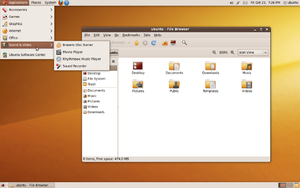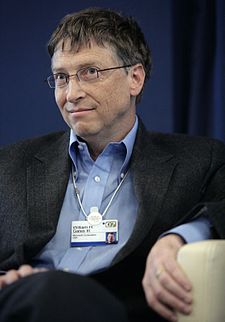 Ubuntu (pronounced /uːˈbuːntuː/), is a computer operating system based on the Debian GNU/Linux distribution. It is named after the Southern African ethical ideology Ubuntu ("humanity towards others") and is distributed as free and open source software. Ubuntu provides an up-to-date, stable operating system for the average user, with a strong focus on usability and ease of installation. Ubuntu has been selected by readers of desktoplinux.com as the most popular Linux distribution for the desktop, claiming approximately 30% of Linux desktop installations in both 2006 and 2007. Web statistics from late 2009 suggest that Ubuntu's share is between 40 and 50%.
Ubuntu (pronounced /uːˈbuːntuː/), is a computer operating system based on the Debian GNU/Linux distribution. It is named after the Southern African ethical ideology Ubuntu ("humanity towards others") and is distributed as free and open source software. Ubuntu provides an up-to-date, stable operating system for the average user, with a strong focus on usability and ease of installation. Ubuntu has been selected by readers of desktoplinux.com as the most popular Linux distribution for the desktop, claiming approximately 30% of Linux desktop installations in both 2006 and 2007. Web statistics from late 2009 suggest that Ubuntu's share is between 40 and 50%. Ubuntu is composed of multiple software packages, of which the vast majority are distributed under a free software license (also known as open source). The main license used is the GNU General Public License (GNU GPL) which, along with the GNU Lesser General Public License (GNU LGPL), explicitly declare that users are free to run, copy, distribute, study, change, develop and improve the software. Ubuntu is sponsored by the UK-based company Canonical Ltd., owned by South African entrepreneur Mark Shuttleworth. By keeping Ubuntu free and open source, Canonical is able to utilize the talents of community developers in Ubuntu's constituent components. Instead of selling Ubuntu for profit, Canonical creates revenue by selling technical support and from creating several services tied to Ubuntu.
Canonical endorses and provides support for three additional Ubuntu-derived operating systems: Kubuntu, Edubuntu and Ubuntu Server Edition. There are several other derivative operating systems including local language and hardware-specific versions.
Canonical releases new versions of Ubuntu every six months and supports Ubuntu for eighteen months by providing security fixes, patches to critical bugs and minor updates to programs. LTS (Long Term Support) versions, which are released every two years, are supported for three years on the desktop and five years for servers. The current version of Ubuntu, 9.10 (Karmic Koala), was released on October 29, 2009.
Several official and unofficial Ubuntu variants exist. These Ubuntu variants install a set of packages that differ from the original Ubuntu distribution.
Official variants store packages and updates in the same repositories as Ubuntu, so that the same software is available for each of them and is generally compatible between the official variants. The Ubuntu derivatives that are fully supported by Canonical are:[10]
- Kubuntu, a desktop distribution using KDE rather than GNOME.
- Edubuntu, a GNOME-based subproject and add-on for Ubuntu, designed for school environments and home users.[58]
- Ubuntu Server Edition.
- Ubuntu JeOS, "Just enough Operating System" for virtual appliances.[59][60]
The following are Canonical-sponsored derivatives:[61]
- Xubuntu, a "lightweight" distribution based on the Xfce desktop environment instead of GNOME, designed to run better on low-specification computers.
- Ubuntu MID Edition, an Ubuntu edition that targets Mobile Internet Devices.[62]
- Ubuntu Netbook Remix,[63][64] designed for netbooks and other ultra-portables.
There are also many unofficial variants, unsponsored derivatives, and other localizations and customizations not controlled or guided by Canonical, which generally contain customizations that have been created for specific goals.















































No comments:
Post a Comment